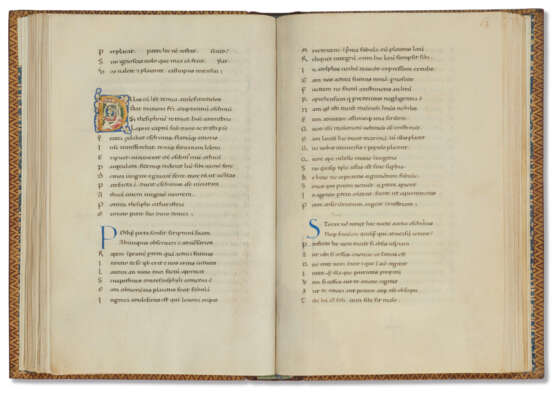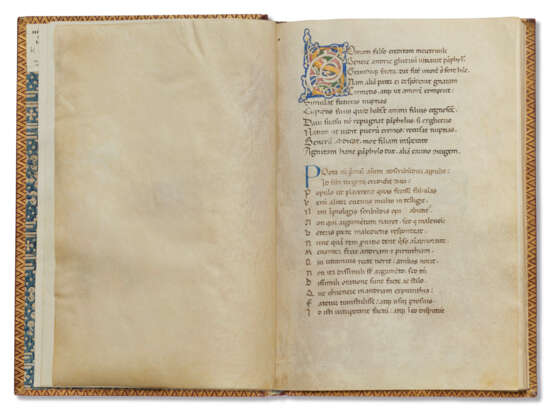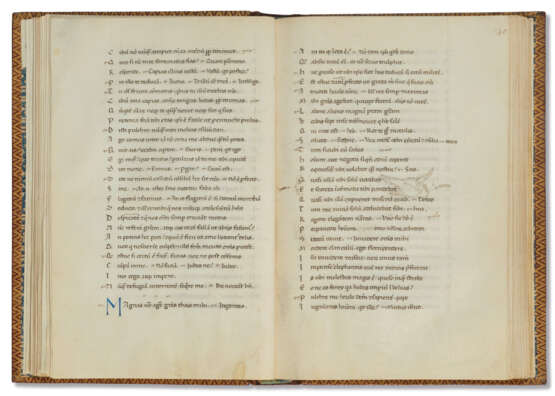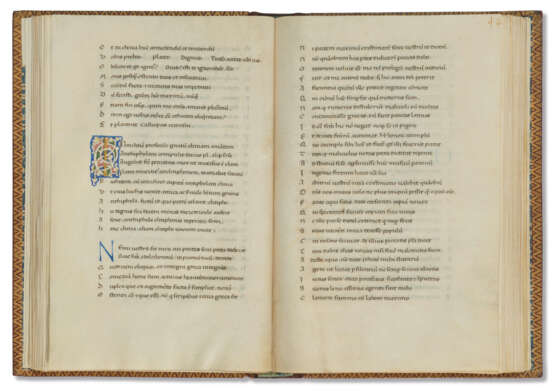ID 794579
Lot 26 | TERENTIUS AFER, Publius (185-159 BCE)
Valeur estimée
£ 70 000 – 100 000
Comoedia, in Latin, illuminated manuscript on vellum. [Florence?, second quarter of the 15th century].
A splendid copy of the Comedies of Terence – a Roman playright who has long associated with Africa and heralded as the first poet of the African diaspora – assiduously annotated for performance with near contemporary corrections and character cues in the margins, previously in the collections of William Gladstone at Hawarden Castle.
244 x 159mm, 117 leaves, complete, collation: 17 (of 8, i a cancelled blank), 2-38, 47 (of 8, iv a cancelled blank), 5-148, 157 (of 8, viii a cancelled blank), old ink foliation 3-120 followed here (repeating 49 and omitting 84 and 101), catchwords survive, 27 lines written in a handsome calligraphic, almost humanistic littera textualis, ruled space: 177 x 99mm, 2-line blue initials throughout, 7 large initials in burnished gold with white vine decoration in-filled with green and pink on blue ground, contemporary notes in a humanist cursive hand, two lines of text on f.30 cancelled, marked 'vacant' and showing a wolf swallowing them, a further line of text on f.96 marked ‘vacat’, with a manicule pointing at it (lower blank margins of 5 leaves cut away and skilfully replaced, unobtrusive wormhole in last leaves.) 18th-century red morocco gilt, green morocco label, edges gilt.
Provenance:
(1) William Ewart Gladstone, Prime Minister: book label of Hawarden Castle Library, KK.I.6; sold by his descendant Sir William Gladstone at Christie’s, 8 December 1982, lot 121.
(2) Sotheby’s, 18 June 1991, lot 83.
(3) Christie’s, 3 April 1996, lot 7.
Content: Publius Terentius Afer, Comoedia, each play preceded by Gaius Sulpicius Apollinaris’ 12-line synopses, or Periochae Terentianae, ff.1-beginning ‘Sororem falso creditam meretricule […]’, followed by the Andria (The Woman of Andros) ff.1-22; Eunuchus (The Eunuch) ff.22-43v; Heautontimorumenos (The Self-Tormenter) ff.43v-62v; Adelphi (The Brothers) ff.62v-82; Hecyra (The Mother-in-Law) ff.82-100; Phormio ff.100-120v, ending ‘Vos valete et plaudit. Calliopus recensui. Amen. Deo gratias. Terrentii Afri Comoediar[um] finis’.
Terence is one of the great early Roman comic playwrights. Like his contemporary literary rival Plautus, he adapted Greek plays from the late phases of Attic comedy, but unlike Plautus he placed greater emphasis on subtle characterisation and nuanced comedy rather than topical humour and slapstick. Only six of his plays survive: he died suddenly at the age of 25 while returning to Rome from Greece. His incredible popularity during the Middle Ages and the Renaissance is attested to by the c.650 surviving manuscripts containing part or all of his plays (see C. Villa, La "Lectura Terentii", vol. I, da Ildemano a Francesco Petrarca, Studi sul Petrarca 17, 1984). The Ottonian playwright Hrotsvitha, Abbess of Gandersheim (c.935-973), wrote her 6-play Book of Drama as a Catholic alternative to Terence, juxtaposing the chastity and perseverance of Catholic women with Terence’s portrayal or Roman women as weak and meretricious. Martin Luther not only quoted Terence frequently to tap into his insights into all things human but also recommended his comedies for the instruction of children in school. The first documented post-antique performance of one of Terence's plays, Andria, took place in Florence in 1476, but the present manuscript, with its careful Renaissance annotations marking textual corrections and character cues, is a clear indication that performance of the plays took place much earlier.
Special Notice
No VAT on hammer price or buyer's premium.
| Lieu d'origine: | Italie, Europe |
|---|---|
| Catégorie maison de vente aux enchères: | Manuscrits médiévaux et de la Renaissance |
| Lieu d'origine: | Italie, Europe |
|---|---|
| Catégorie maison de vente aux enchères: | Manuscrits médiévaux et de la Renaissance |
| Adresse de l'enchère |
CHRISTIE'S 8 King Street, St. James's SW1Y 6QT London Royaume-Uni | |
|---|---|---|
| Aperçu |
| |
| Téléphone | +44 (0)20 7839 9060 | |
| Commission | see on Website | |
| Conditions d'utilisation | Conditions d'utilisation |







